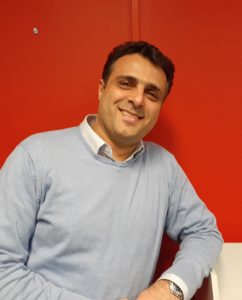Passion for language fuels migrant’s dreams
Iranian migrant Rahman Abarin drove buses and spent endless hours working and studying to achieve his dream of becoming an English teacher.
He set out on a difficult path to reconstruct his professional identity and achieve his goal of teaching English in Australia.
His passion for the English language and for teaching sustained him thorough a tough financial and emotional period after he arrived in Australia with his wife in 2015.
Now as an English as an Additional Language (EAL) teacher with migrant and refugee settlement agency AMES Australia, Rahman says he has achieved a 30-year dream.
“I started with AMES in 2015 as a volunteer tutor working in the AMEP program for two years. It was a dream for me to become a teacher at AMES and it was a dream that came true,” he said.
 Rahman, now 42, was just 13 when his love affair with the English language began.
Rahman, now 42, was just 13 when his love affair with the English language began.
“It was people like my mum who first recognised that I had a gift for languages and encouraged me. I remember one morning she stood in queue to enrol in one of the few language schools in our city,” he said.
Rahman’s home town of Kerman, a city of almost million people in south eastern Iran, now has many language schools.
“These days, people in Iran see English as a way of engaging in an increasingly globalised world,” he said.
“Language has always been a journey for me, learning and teaching language. And from the time I started learning English, I have always had a dream to continue studying and to teach English in a native speaking country.
“And I regard this journey as a dream come true; for me to have come to a native speaking country and continue my studies and then finally get a job working as an English teacher here in Australia is thanks to my family, my wife, my students and teachers and my own perseverance and hard work.
“I have been following this dream, I made it a goal for myself, and I’ve worked day and night to achieve it,” he said.
Rahman worked as an electrical engineer and as an English teacher in Iran.
“At some stages during my language journey, I worked part-time as an engineer and as a part-time English teacher. At some stages used to manage a language centre in the mornings and teach in the afternoons,” he said.
“English is taught at secondary school level in Iran but our English language school taught almost all age groups including pre-school pupils, primary and secondary students as well as young adults and adults.
“For many families English language learning is a popular extra-curricular activity for parents to give their kids – like music or sport,” Rahman said.
After arriving in Australia as a skilled migrant Rahman did odd jobs and even drove a bus to fund his studies, often work and studying 15 hours a day.
“I worked full time in different jobs, even driving a bus so I could pursue my dream,” Rahman said.
“I drove buses to support my family and fund my studies. I worked overtime and at weekends for two years while I was studying.
“At one point I experiences a professional identity crisis. I was thinking: ‘What am I doing here, I’m not a driver or a teacher?’,” he said.
“But I told myself that it was not forever and that it was a means to an end. It was part of the concept I had in my head of ‘becoming’ – in my case, becoming a teacher.
“I ended up liking driving. It’s an important job and I have great respect for people who do it. But it was not my passion,” he said.
Rahman even studied on his work breaks.
“I would take my books with me on the bus and study during meal breaks,” he said.
“I have always enjoyed working hard. Even in Iran I was working 14 hours a day doing teaching jobs.
“I could see I was helping people in my community; helping to train teachers and I’m proud of that.
“My driving force is to help people achieve their goals and become what they have a passion to be,” Rahman said.
He started his studies in Australia with a Certificate IV in Teaching English to Speakers of Other Languages (TESOL) progressing to a diploma and ultimately taking up an offer to do a Master’s Degree in TESOL at Monash University.
“My grades were high enough to be offered the opportunity to do a semester of research,” he said.
In his six-month long research project, Rahman studied his own language learning and teaching journey producing an auto-ethnography.
“It’s a narrative about the challenges I faced and it explores the intersection of language, culture, identity and difference. I hope to have it published one day,” he said.
Rahman said that in the future he is keen to explore more English literature.
“I’m very keen to explore literature. It will teach me more about Australian and western culture because language, identity, literature and culture are my four main passions; and literature represents culture and history,” Rahman said.
“As per my plan, I believe passion, planning and perseverance are determining factors in achieving your goals,” he said.












